高中英语外研版必修4Module 1 Life in the FutureM1P4 Grammar(共40张PPT)
文档属性
| 名称 | 高中英语外研版必修4Module 1 Life in the FutureM1P4 Grammar(共40张PPT) |  | |
| 格式 | zip | ||
| 文件大小 | 4.4MB | ||
| 资源类型 | 教案 | ||
| 版本资源 | 外研版 | ||
| 科目 | 英语 | ||
| 更新时间 | 2019-12-10 15:47:22 | ||
图片预览

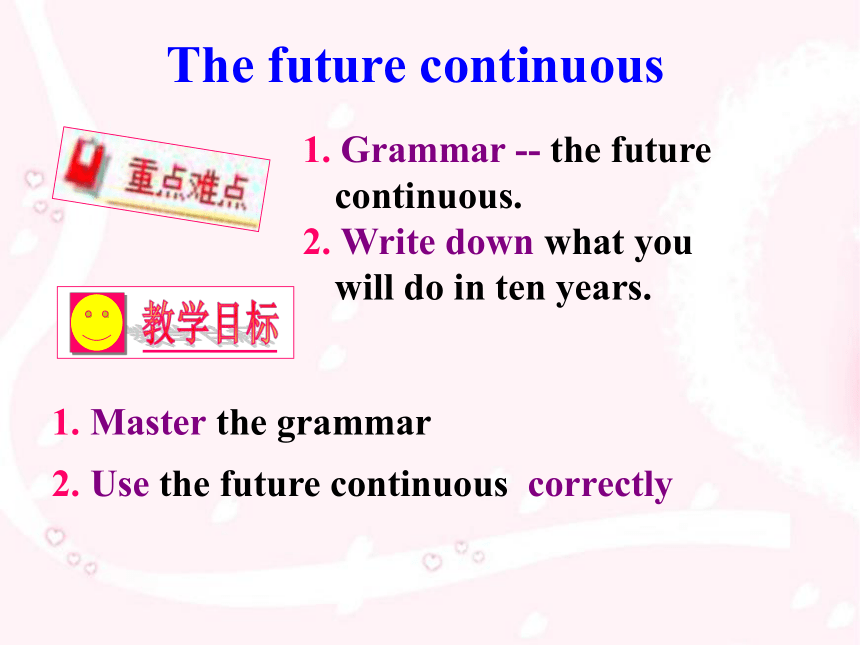
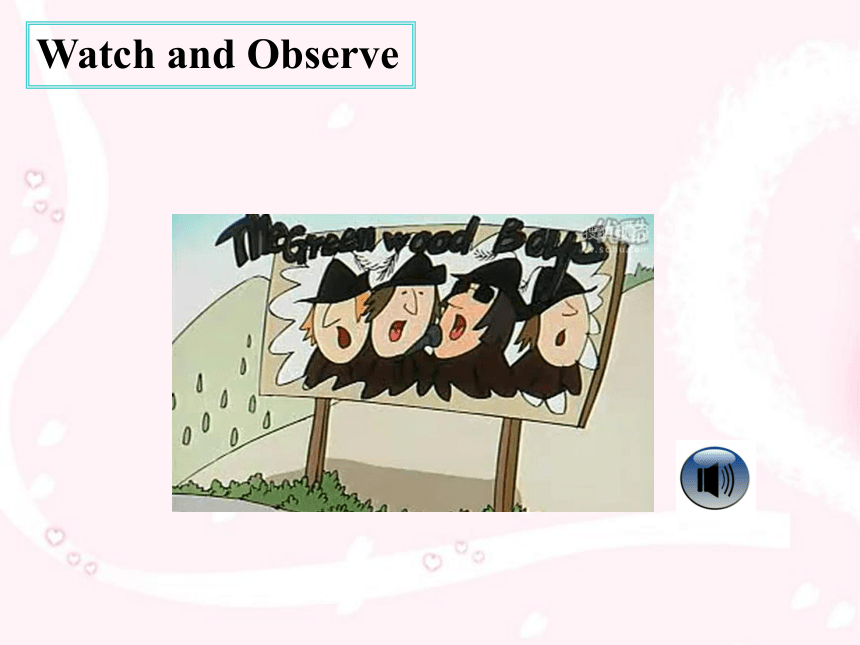
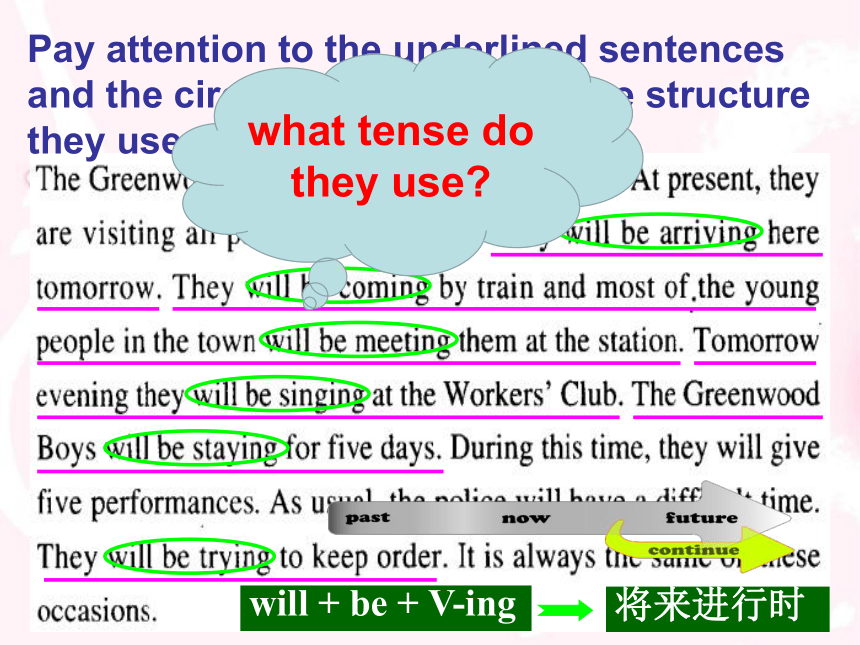
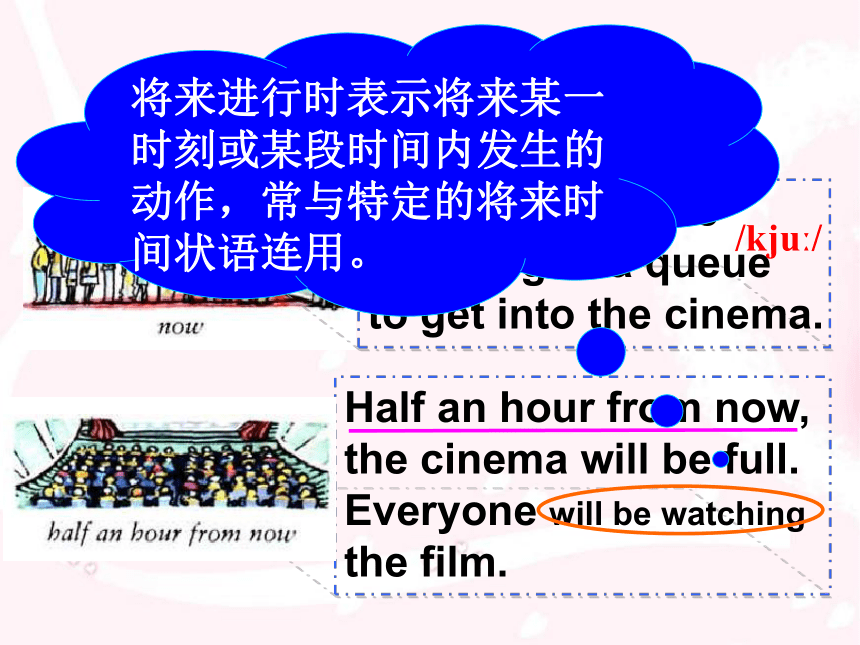
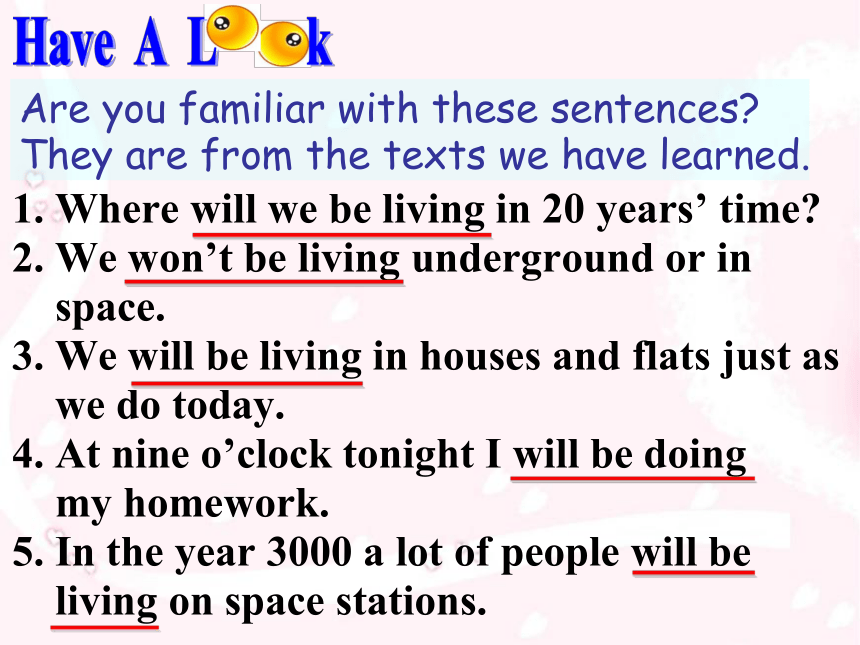
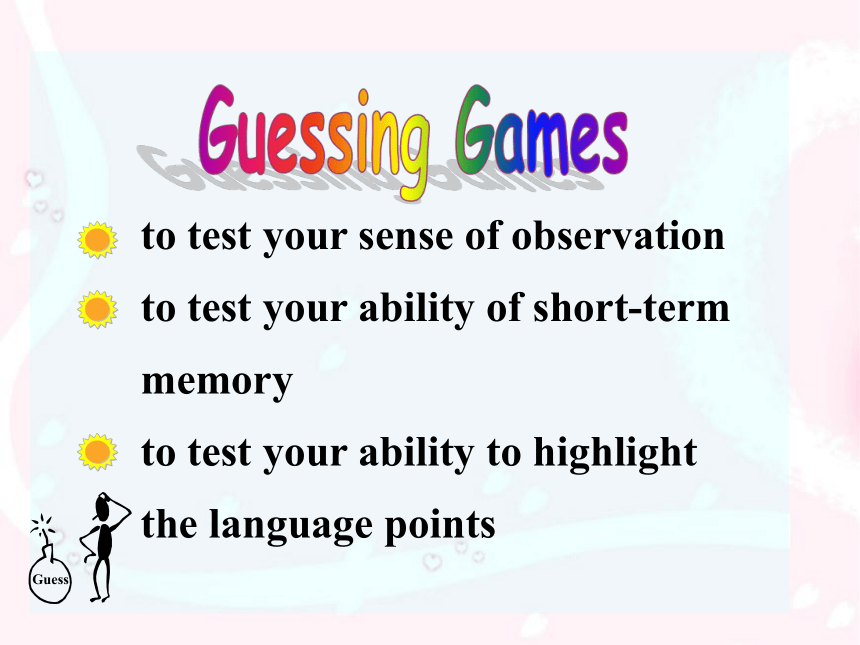
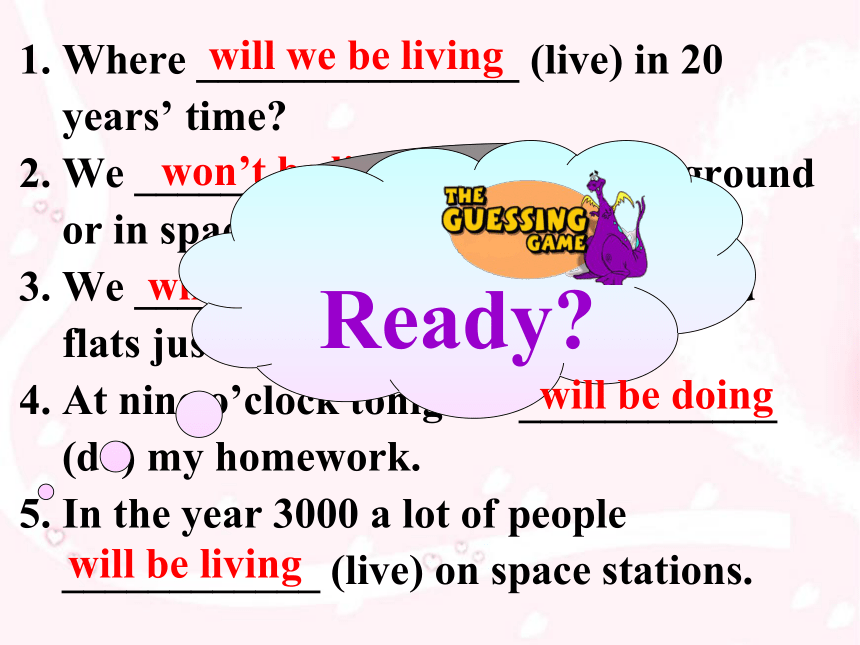
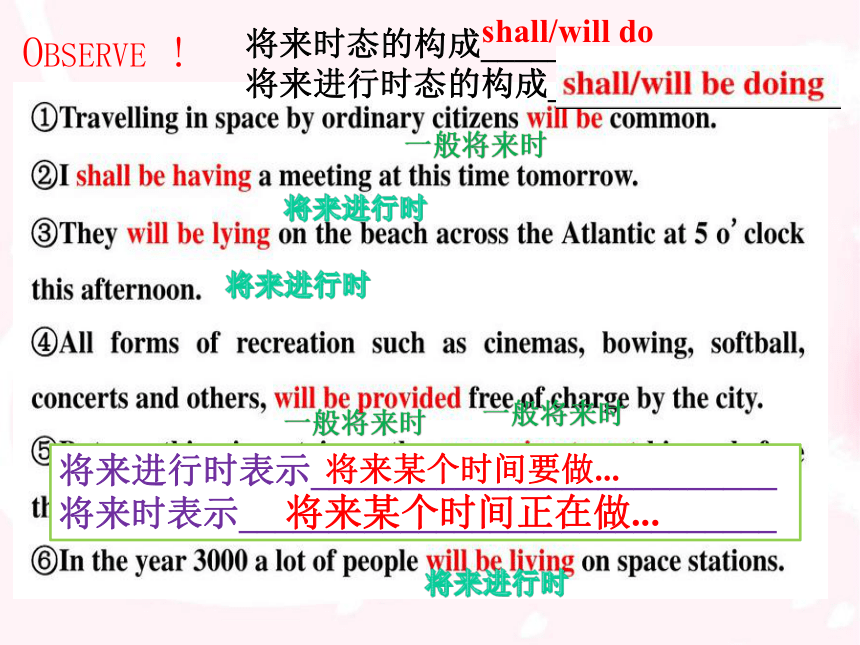
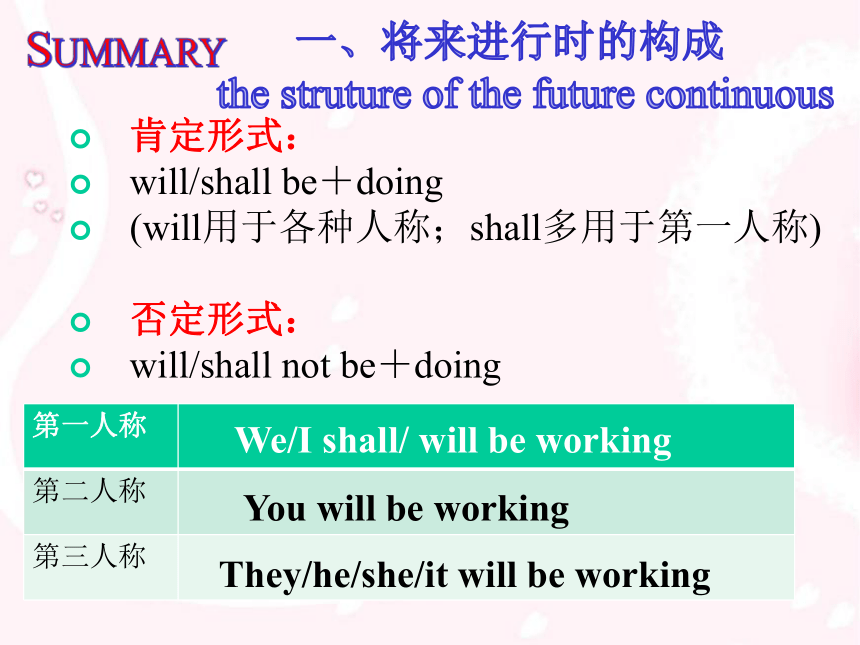


文档简介
(共40张PPT)
Module 1
Life in the future
P4
Grammar
The future continuous
1. Grammar -- the future continuous.
2. Write down what you will do in ten years.
1. Master the grammar
2. Use the future continuous correctly
Watch and Observe
Pay attention to the underlined sentences and the circled words and get the structure they use.
will + be + V-ing
将来进行时
what tense do they use?
Study this example situation
Half an hour from now, the cinema will be full. Everyone will be watching the film.
These people are standing in a queue to get into the cinema.
将来进行时表示将来某一时刻或某段时间内发生的动作,常与特定的将来时间状语连用。
/kju?/
1. Where will we be living in 20 years’ time?
2. We won’t be living underground or in
space.
3. We will be living in houses and flats just as
we do today.
4. At nine o’clock tonight I will be doing
my homework.
5. In the year 3000 a lot of people will be
living on space stations.
Are you familiar with these sentences? They are from the texts we have learned.
to test your sense of observation
to test your ability of short-term memory
to test your ability to highlight the language points
1. Where _______________ (live) in 20
years’ time?
2. We _______________ (live) underground
or in space.
3. We ____________ (live) in houses and
flats just as we do today.
4. At nine o’clock tonight I ____________
(do) my homework.
5. In the year 3000 a lot of people
____________ (live) on space stations.
will be living
won’t be living
will we be living
go
Ready?
will be doing
will be living
Observe !
将来时态的构成________________
将来进行时态的构成_____________
shall/will do
将来进行时表示__________________________
将来时表示______________________________
将来某个时间正在做...
将来某个时间要做...
肯定形式:
will/shall be+doing
(will用于各种人称;shall多用于第一人称)
否定形式:
will/shall not be+doing
We/I shall/ will be working
You will be working
They/he/she/it will be working
第一人称
第二人称
第三人称
(1)表示将来某一时刻或某段时间正在进行的动作,常与at this time tomorrow,at 4 o'clock tomorrow afternoon,this time next week等时间状语连用。
I will be doing my homework this time tomorrow.
Don’t phone me between 9 and 11 tomorrow morning. I’ll be having a meeting then.
(2)表示对将来的情况或结果的预测,不表示动作正在进行。
After you take the medicine, you will be feeling much better.
We believe that farmers’ life will be
getting better and better in the future
(3) 表示现在正在进行的动作,但这个动作会延续到将来。
I wonder if the volcano will still be erupting tomorrow.
I think that the doctor will be working on the surgery until tomorrow morning.
(4). 将来进行时还可以表示按计划或安排将要做的事。
We shall be having a meeting in a
minute.
I’ll be seeing her this evening.
We’ll be getting in touch
with you.
Jane can’t attend the meeting at 3 o’clock this afternoon because she _______ a class at that time.
A. will teach B. would teach
C. has taught D. will be teaching
D
---guess what? We’ve got our visas for a short-term visit to the UK this summer.
---How nice! You ________ a different culture then.
A. will be experiencing
B. have experienced
C. have been experiencing
D. will have experienced
A
预测
一般将来时表示将来要做的事、临时的决定或一种习惯、倾向
I’ll get rid of the garbage right away, ok?
Solar energy will never be used up.
将来进行时表示将来某一时刻正在进行的动作。
He will be complaining now in the supermarket.
表示将来要发生的动作
表示将来某时要进行的动作
一般将来时
将来进行时
过去 现在 将来
过去 现在 将来
1. Why don’t you put the meat in the fridge?
It will _____ fresh for several days.
be stayed B. stay
C. be staying D. have stayed
C
Choose the best answers
2. At this time tomorrow ___ for New York.
A. we’re going to fly B. we’ll be flying
C. we’ll fly D. we’re to fly
B
(1)will/shall do
表示在将来某个时间要发生的动作或存在的状态,常与表示将来的时间状语连用;will do也可指临时决定做某事。
I believe China will become one of the richest countries in the world.
我相信中国将成为世界上最富裕的国家之一。
表示打算在最近或将来要做的事,或根据已有的迹象推测很可能发生某事。
I am going to buy a new coat this winter.
今年冬天我打算买一件新外套。
be going to do
表示按计划约定去做某事或按职责、义务和要求必须去做某事。
The highway is to be opened next week.
这条公路将于下周开放。
be to do
表示即将发生的动作,句中不用表示将来的确切的时间状语。
Walk up!Walk up!The performance is about to begin.
快过来!快过来!表演马上开始了。
be about to do或be on the point of doing
通常表示按计划或安排将发生的动作,常用于少数瞬间性的动作(go,come,leave,start,begin,take off等)。
When are you leaving?
你什么时候离开?
现在进行时表将来
will / shall do
be going to do
be about to do/
be on the point of doing
do / does
be doing
be to do
HOW
to express
the simple future tense
1. ---can I call you back at two o’clock this afternoon?
---I am sorry, but by then I _________(fly) to Beijing. How about five?
2. ---what time is it?
---I have no idea. But just a minute, I _______(check) it for you.
3. ---You forgot to turn the gas off.
--- oh, I ___________(turn) it off.
Will be flying
Will check
Will turn
4. I was about _________(go) out when the telephone rang.
5. we are __________(obey) the school rules.
6. My uncle__________(come) to see us. He will be here soon.
is coming
to go
to obey
7. Doctor Wang_______________(give) another talk on this subject at the same time next week.
8. The train _______(leave) Beijing at 11:00 and arrives in Shanghai at 16:00.
9. I think the kids________________(do) their homework when we get home.
will be doing
will be giving
leaves
Using will can indicate willingness, intention, invitation, etc.
The future continuous is sometimes used to indicate that a future activity is pre-arranged.
Ann’ll help us organise the party.
Ann will be helping us to organise the party.
(suggests a previous arrangement)
(suggests she is willing to help)
一般将来时既可表示“将来”,也可表示“意志,意图”,而将来进行时表示“纯粹的将来”,指说话者一种无意图的动作。
* 将来进行时表示将来某一时刻或某段时间内发生的动作,常与特定的将来时间状语连用。
* 将来进行时表示已经决定或安排好的要发生的动作或事情。
* 将来进行时表示预料中要发生的动作。
将来进行时的构成:will/shall + be + V-ing
注: word 文档
点击此处链接
1. If you plant watermelon seeds in the
spring, you _____________ (eat) fresh
watermelon in the fall. (2010 浙江)
2. — Can I call you back at two o’clock
this afternoon?
— I’m sorry, but by then I ___________
(fly) to Beijing. How about five?
(2012陕西)
I. 用所给动词的正确时态填空。
will be eating
will be flying
3. — Could I use your car tomorrow
morning?
— Sure. I _____________ (write) a report
at home. (2013江苏)
4. — Dr. Jackson is not in his office at the
moment.
— All right. I ________ (call) him later.
(2015北京)
5. Jane can’t attend the meeting at 3 o’clock
this afternoon because she _____________
(teach) a class at that time. (2015天津)
will be writing
will call
will be teaching
II. 翻译句子。 1. 我明天这个时候将在餐馆等你。 2. 明天上午十点她将在她的办公室开会。
3. 乔治不来了,他有一个重要的会议要参
加。
I will be waiting for you at the restaurant this time tomorrow.
She will be having a meeting in her office at 10 am tomorrow.
George won’t come. He has an important meeting to attend.
4. 你下午用电脑吗?不用的话,我可以用
吗?
5. 明天我要去送一位朋友。他的火车8点开。
6. 吃了这些药,你会感觉好多了的。
I am seeing a friend off tomorrow. His train leaves at 8 o’clock.
Will you be using your computer this afternoon? If not, can I use it?
After you take the medicine, you will be feeling much better.
III. 阅读下面材料,在空白处填入适当内容或
括号内单词的正确形式。
Debbie Hart is going to swim across the English Channel tomorrow. She is going to set out from the French coast at five o'clock in the morning. Debbie is only eleven years old and she hopes to set up a new world record. She is a strong swimmer and many people feel that she is sure to succeed. Debbie's father __________ (set out) with her in a small boat.
will set out
Mr. Hart __________ (train) his daughter for years. Tomorrow he ______________ (watch) her anxiously as she swims the long distance to England. Debbie intends to take short rests every two hours. She will have something to drink but she __________ (eat) any solid food. Most of Debbie's school friends _____________ (wait) for her on the English coast. Among them will be Debbie's mother, who swam the Channel herself when she _____ (be) a girl.
has trained
will be watching
will not eat
will be waiting
was
Homework
Finish the exercises in Learning English.
The Usage of the Simple Future Tense
表示计划或安排好的动作(go, come, leave, begin 等动词)
表示主语计划打算的行动
或看来就要发生的事情
表示将来发生的动作或出现的状态, shall仅与第一人称连用
FORM USAGE
will/shall do
be going to do
be doing
表示客观上计划或安排好的动作
表示与安排,计划或时刻表有关的动作;或用于if, when等状语从句中代替will do
表示即将发生的动作,
一般不带时间副词或短语
FORM USAGE
be to do
be about to do
do
Module 1
Life in the future
P4
Grammar
The future continuous
1. Grammar -- the future continuous.
2. Write down what you will do in ten years.
1. Master the grammar
2. Use the future continuous correctly
Watch and Observe
Pay attention to the underlined sentences and the circled words and get the structure they use.
will + be + V-ing
将来进行时
what tense do they use?
Study this example situation
Half an hour from now, the cinema will be full. Everyone will be watching the film.
These people are standing in a queue to get into the cinema.
将来进行时表示将来某一时刻或某段时间内发生的动作,常与特定的将来时间状语连用。
/kju?/
1. Where will we be living in 20 years’ time?
2. We won’t be living underground or in
space.
3. We will be living in houses and flats just as
we do today.
4. At nine o’clock tonight I will be doing
my homework.
5. In the year 3000 a lot of people will be
living on space stations.
Are you familiar with these sentences? They are from the texts we have learned.
to test your sense of observation
to test your ability of short-term memory
to test your ability to highlight the language points
1. Where _______________ (live) in 20
years’ time?
2. We _______________ (live) underground
or in space.
3. We ____________ (live) in houses and
flats just as we do today.
4. At nine o’clock tonight I ____________
(do) my homework.
5. In the year 3000 a lot of people
____________ (live) on space stations.
will be living
won’t be living
will we be living
go
Ready?
will be doing
will be living
Observe !
将来时态的构成________________
将来进行时态的构成_____________
shall/will do
将来进行时表示__________________________
将来时表示______________________________
将来某个时间正在做...
将来某个时间要做...
肯定形式:
will/shall be+doing
(will用于各种人称;shall多用于第一人称)
否定形式:
will/shall not be+doing
We/I shall/ will be working
You will be working
They/he/she/it will be working
第一人称
第二人称
第三人称
(1)表示将来某一时刻或某段时间正在进行的动作,常与at this time tomorrow,at 4 o'clock tomorrow afternoon,this time next week等时间状语连用。
I will be doing my homework this time tomorrow.
Don’t phone me between 9 and 11 tomorrow morning. I’ll be having a meeting then.
(2)表示对将来的情况或结果的预测,不表示动作正在进行。
After you take the medicine, you will be feeling much better.
We believe that farmers’ life will be
getting better and better in the future
(3) 表示现在正在进行的动作,但这个动作会延续到将来。
I wonder if the volcano will still be erupting tomorrow.
I think that the doctor will be working on the surgery until tomorrow morning.
(4). 将来进行时还可以表示按计划或安排将要做的事。
We shall be having a meeting in a
minute.
I’ll be seeing her this evening.
We’ll be getting in touch
with you.
Jane can’t attend the meeting at 3 o’clock this afternoon because she _______ a class at that time.
A. will teach B. would teach
C. has taught D. will be teaching
D
---guess what? We’ve got our visas for a short-term visit to the UK this summer.
---How nice! You ________ a different culture then.
A. will be experiencing
B. have experienced
C. have been experiencing
D. will have experienced
A
预测
一般将来时表示将来要做的事、临时的决定或一种习惯、倾向
I’ll get rid of the garbage right away, ok?
Solar energy will never be used up.
将来进行时表示将来某一时刻正在进行的动作。
He will be complaining now in the supermarket.
表示将来要发生的动作
表示将来某时要进行的动作
一般将来时
将来进行时
过去 现在 将来
过去 现在 将来
1. Why don’t you put the meat in the fridge?
It will _____ fresh for several days.
be stayed B. stay
C. be staying D. have stayed
C
Choose the best answers
2. At this time tomorrow ___ for New York.
A. we’re going to fly B. we’ll be flying
C. we’ll fly D. we’re to fly
B
(1)will/shall do
表示在将来某个时间要发生的动作或存在的状态,常与表示将来的时间状语连用;will do也可指临时决定做某事。
I believe China will become one of the richest countries in the world.
我相信中国将成为世界上最富裕的国家之一。
表示打算在最近或将来要做的事,或根据已有的迹象推测很可能发生某事。
I am going to buy a new coat this winter.
今年冬天我打算买一件新外套。
be going to do
表示按计划约定去做某事或按职责、义务和要求必须去做某事。
The highway is to be opened next week.
这条公路将于下周开放。
be to do
表示即将发生的动作,句中不用表示将来的确切的时间状语。
Walk up!Walk up!The performance is about to begin.
快过来!快过来!表演马上开始了。
be about to do或be on the point of doing
通常表示按计划或安排将发生的动作,常用于少数瞬间性的动作(go,come,leave,start,begin,take off等)。
When are you leaving?
你什么时候离开?
现在进行时表将来
will / shall do
be going to do
be about to do/
be on the point of doing
do / does
be doing
be to do
HOW
to express
the simple future tense
1. ---can I call you back at two o’clock this afternoon?
---I am sorry, but by then I _________(fly) to Beijing. How about five?
2. ---what time is it?
---I have no idea. But just a minute, I _______(check) it for you.
3. ---You forgot to turn the gas off.
--- oh, I ___________(turn) it off.
Will be flying
Will check
Will turn
4. I was about _________(go) out when the telephone rang.
5. we are __________(obey) the school rules.
6. My uncle__________(come) to see us. He will be here soon.
is coming
to go
to obey
7. Doctor Wang_______________(give) another talk on this subject at the same time next week.
8. The train _______(leave) Beijing at 11:00 and arrives in Shanghai at 16:00.
9. I think the kids________________(do) their homework when we get home.
will be doing
will be giving
leaves
Using will can indicate willingness, intention, invitation, etc.
The future continuous is sometimes used to indicate that a future activity is pre-arranged.
Ann’ll help us organise the party.
Ann will be helping us to organise the party.
(suggests a previous arrangement)
(suggests she is willing to help)
一般将来时既可表示“将来”,也可表示“意志,意图”,而将来进行时表示“纯粹的将来”,指说话者一种无意图的动作。
* 将来进行时表示将来某一时刻或某段时间内发生的动作,常与特定的将来时间状语连用。
* 将来进行时表示已经决定或安排好的要发生的动作或事情。
* 将来进行时表示预料中要发生的动作。
将来进行时的构成:will/shall + be + V-ing
注: word 文档
点击此处链接
1. If you plant watermelon seeds in the
spring, you _____________ (eat) fresh
watermelon in the fall. (2010 浙江)
2. — Can I call you back at two o’clock
this afternoon?
— I’m sorry, but by then I ___________
(fly) to Beijing. How about five?
(2012陕西)
I. 用所给动词的正确时态填空。
will be eating
will be flying
3. — Could I use your car tomorrow
morning?
— Sure. I _____________ (write) a report
at home. (2013江苏)
4. — Dr. Jackson is not in his office at the
moment.
— All right. I ________ (call) him later.
(2015北京)
5. Jane can’t attend the meeting at 3 o’clock
this afternoon because she _____________
(teach) a class at that time. (2015天津)
will be writing
will call
will be teaching
II. 翻译句子。 1. 我明天这个时候将在餐馆等你。 2. 明天上午十点她将在她的办公室开会。
3. 乔治不来了,他有一个重要的会议要参
加。
I will be waiting for you at the restaurant this time tomorrow.
She will be having a meeting in her office at 10 am tomorrow.
George won’t come. He has an important meeting to attend.
4. 你下午用电脑吗?不用的话,我可以用
吗?
5. 明天我要去送一位朋友。他的火车8点开。
6. 吃了这些药,你会感觉好多了的。
I am seeing a friend off tomorrow. His train leaves at 8 o’clock.
Will you be using your computer this afternoon? If not, can I use it?
After you take the medicine, you will be feeling much better.
III. 阅读下面材料,在空白处填入适当内容或
括号内单词的正确形式。
Debbie Hart is going to swim across the English Channel tomorrow. She is going to set out from the French coast at five o'clock in the morning. Debbie is only eleven years old and she hopes to set up a new world record. She is a strong swimmer and many people feel that she is sure to succeed. Debbie's father __________ (set out) with her in a small boat.
will set out
Mr. Hart __________ (train) his daughter for years. Tomorrow he ______________ (watch) her anxiously as she swims the long distance to England. Debbie intends to take short rests every two hours. She will have something to drink but she __________ (eat) any solid food. Most of Debbie's school friends _____________ (wait) for her on the English coast. Among them will be Debbie's mother, who swam the Channel herself when she _____ (be) a girl.
has trained
will be watching
will not eat
will be waiting
was
Homework
Finish the exercises in Learning English.
The Usage of the Simple Future Tense
表示计划或安排好的动作(go, come, leave, begin 等动词)
表示主语计划打算的行动
或看来就要发生的事情
表示将来发生的动作或出现的状态, shall仅与第一人称连用
FORM USAGE
will/shall do
be going to do
be doing
表示客观上计划或安排好的动作
表示与安排,计划或时刻表有关的动作;或用于if, when等状语从句中代替will do
表示即将发生的动作,
一般不带时间副词或短语
FORM USAGE
be to do
be about to do
do
